The Hindu Editorial (Clear and distinct) – May 03, 2021
Elections present an opportunity for political change, but voters at times prefer the familiar comfort of continuity and reward performance over promise. For further reading, visit “The Hindu”. Below is today’s word list-1 for The Hindu Editorial (Clear and distinct) – May 03, 2021.
To read this article, click here.
This preview is provided here with permission.
Courtesy: The Hindu
The Hindu Editorial (Clear and distinct) – May 03, 2021:
- distinct adjective) – clear-cut, definite, well defined, sharp, unmistakable.
- hold (verb) – to have something.
- at times phrase) – sometimes, occasionally, now and then.
- comfort (noun) – ease, content, well-being.
- continuity (noun) – stability, constancy, continuance.
- incumbent (noun) – the present holder or occupant of an office.
- theme (noun) – subject, matter, concept, concern.
- myriad (adjective) – a great number, countless, various.
- visible (adjective) – recognizable, noticeable, distinguishable, discernible.
- appeal (noun) – charisma, attraction, allure/charm, drawing power, fascination.
- empathy (noun) – compassion, sympathy, feeling, concern, consideration.
- nationalism (noun) – it refers to a system (with a narrow set of ideas) created by a group of people who believe their nation is superior to all others. It is also a perception of national superiority and an orientation toward national dominance- called chauvinism (excessive nationalism).
- apparent (adjective) – evident/clear, visible, noticeable, recognizable.
- critic (noun) – censurer, attacker, belittler, fault-finder.
- ideological (adjective) – relating to a system of ideas.
- in contrast (phrase) – when compared to another.
- arrest (verb) – stop, halt, end, restrict, prevent.
- slide (noun) – fall, descend, decline.
- gather one’s wits (phrase) – try to be calm and think more clearly in a difficult situation.
- yield (verb) – produce, give, provide (results).
- expose (verb) – reveal, show, display, exhibit, unveil.
- a chink in someone’s armour (phrase) – a weak point/fault in someone’s character, arguments & etc., which can be used to attack/criticize them easily.
- robust (adjective) – strong, powerful.
- resistance (noun) – opposition, refusal, denial.
- mobilise (verb) – bring (resources) into use for a particular purpose/cause.
- sub-nationalism (noun) – support for interests of a particular region within a nation/country.
- rampaging (adjective) – excessive, storming, uncontrollable, unrestrained.
- march (noun) – progress, advance; procession.
- for now (phrase) – for the moment, for the present, for the time being.
- bid (noun) – attempt, effort, endeavour/try.
- fall short of (phrase) – fail to meet/reach; be deficient/inadequate/insufficient.
- far (adverb) – very much, considerably, markedly, significantly.
- boast (noun) – bragging, self-praise, excessive pride, self-satisfaction, exaggeration, overstatement.
- obliterate (verb) – destroy, wipe out, abolish, demolish, annihilate (something utterly).
- a force to reckon with (phrase) – a person/thing with strong abilities and strengths cannot be ignored/underrated.
- so far (phrase) – until now, up to the present, up to this point.
- necessarily (adverb) – inevitably, certainly, surely.
- popular (adjective) – public, collective, social, societal.
- crude (adjective) – bad, defective, faulty, inferior; rude, offensive.
- communalism (noun) – adherence/obedience to one’s own ethnic group (against the principle/practice of living together in a wider society).
- deployment (noun) – the bringing of resources into effective action.
- leave aside (phrasal verb) – to not consider something; ignore, dismiss, push aside.
- incumbent (adjective) – current, existing, present.
- strategy (noun) – plan of action.
- costly (adjective) – ruinous, disastrous, devastating, damaging, woeful/awful, terrible, unfortunate.
- in terms of (phrase) – with regard to, regarding/concerning, in connection with.
- public health (noun) – the branch of medicine handling public health; public health is also the science of protecting and improving the health of people and their communities through education, policy making and research for disease and injury prevention.
- credibility (noun) – trustworthiness, reliability, dependability, integrity.
- institutional credibility (noun) – It refers to peoples’ acceptance of an institution based on their perceptions of that institutions’ accountability, representation, legitimacy, transparency, fairness and justice.
- (fourth branch) institution (noun) – the independent institutions, which are tasked with the protection of key constitutional values such as democracy, legality, impartiality, probity, human rights and price stability, are characterized as the fourth branch of the state, because of their distinctiveness from the three “branches”- the executive, legislature and judiciary. In the Indian context, institutions of the fourth branch include the Election Commission, Office of the Comptroller and Auditor General, Central Bureau of Investigation, Reserve Bank, National Statistics Commission, National Human Rights Commission, Public Service Commission, University Grants Commission, Finance Commission, Niti Aayog and many others.
- social harmony (noun) – when people live side by side in peace and mutual respect. (harmony (noun) – unity, solidarity, cooperation, agreement/concord).
- bilateral (adjective) – involving two groups or countries.
- ties (noun) – association, relationship, bond, connection.
- maximalist (adjective) – relating to an approach of a person/organisation (particularly in politics) with extreme thoughts and not ready to compromise.
- campaign (noun) – canvassing, electioneering, an act of soliciting (asking for/requesting) votes; an organized effort that seeks to influence the decision-making progress within a specific group.
- stare at (verb) – look fixedly, gaze.
- explosion (noun) – sudden/rapid increase.
- have one’s work/task cut out (phrase) – be faced with a tough task/work.
- take note of (phrase) – pay attention, heed, take notice, observe, notice.
- resentment (noun) – bitterness, indignation, irritation, enmity, hatred/hate.
- rather than (phrase) – instead of.
- read (verb) – interpret, understand, comprehend.
- high-handedness (noun) – heavy-handedness, autocracy, absolute power, totalitarianism.
- substance (noun) – significant subject, important matter/content, valid message.
- reap (verb) – receive, obtain, get, acquire.
- measure (noun) – action, step, procedure.
- lockdown (noun) – an emergency protocol implemented by the authorities that prevents people from leaving from a place; An extended state of confinement/encirclement/isolation of a person by the authority.
- slew of (noun) – a large number of, lot, range.
- welfare (noun) – a government program that provides (financial) assistance to individuals and families in need; social security, public assistance.
- live up to (phrasal verb) – satisfy, fulfil, achieve, meet.
- inflame (verb) – provoke, incite, arouse, whip up, kindle.
- passion (noun) – strong emotion, feeling, vehemence, vigour.
- strategist (noun) – someone skilled in planning action/policy (especially in politics/war).
- tussle (noun) – fight, clash, contention.
- hiatus (noun) – pause, break, interval.
- aid (verb) – help, assist, support.
- strident (adjective) – in an excessively forceful way; high-pitched, loud & harsh.
- in one’s favour (phrase) – to one’s benefit/advantage.
- resilience (noun) – strength; the capacity to recover quickly from difficulties.
- flux (noun) – instability, unsteadiness, unpredictability.
- at play (phrase) – get involved/become engaged in something actively.
- outgoing (adjective) – departing, leaving.
- beat off (phrasal verb) – defeat, win/beat, overcome.
- mark (verb) – indicate, represent, signify.
- departure (noun) – deviation, change of direction, shift/change.
- anti-incumbency (noun) – a situation which is against elected officials currently in power; discontent against ruling government/ party in power.
- render (verb) – make, cause to be, cause to become.
- antediluvian (adjective) – out of date, old-fashioned, outmoded, outdated.
- prey (noun) – victim, target.
- acumen (noun) – astuteness, shrewdness, sharpness, cleverness.
- considerable (adjective) – substantial, appreciable, significant, much.
- daring (adjective) – brave, bold, audacious.
- social engineering (noun) – the act of tricking someone into divulging (revealing sensitive (or) personal) information or taking action usually through technology. It is to take advantage of a potential victim’s natural tendencies and emotional reactions.
- ripple (verb) – feeling or effect (spreading through someone/something).
- pay dividends (phrase) – to cause good results; to bring an advantage.
- surge (noun) – sudden increase or rise of something.
- command (noun) – authority, control, power.
- eclipse (verb) – outshine, overshadow, surpass, outclass.
- turn out (phrasal verb) – happen, develop, end (in a specific way).
- grim (adjective) – distressing, upsetting, worrying, unpleasant, dismal/awful.
- viable (adjective) – reasonable, practical, logical, sensible, effective.
- disproportionate (adjective) – inordinate, excessive, unreasonable, unfair.
- counterproductive (adjective) – harmful, damaging, dangerous/destructive.
- freelancing (adjective) – self-employed (instead of working for a organization).
- footloose (adjective) – travelling, wandering, wayfaring, roaming.
- sobering (adjective) – serious/sensible, thoughtful; realistic, pragmatic.
- prospects (noun) – possibilities, chances, opportunities.
- ally (noun) – partner, supporting (political) party (with common interests).
- notion (noun) – idea, belief, opinion, view.
- nationalist (noun/adjective) – relating to nationalism.
- straitjacket (noun) – restriction, restraint, constraint.
- diversity (noun) – existence/presence of different people (from a variety of backgrounds and perspectives ranging from race to age to gender to hometown to educational experience) within the group; variety, variance, difference.
- irresponsible (adjective) – thoughtless, unwise, ill-considered.
- pursuit (noun) – quest for, search for.
- taste (verb) – experience, undergo, encounter, meet.
- extinction (noun) – destruction, elimination, eradication, removal (a complete one).
- exclusive (adjective) – not including, excluding, omitting, barring.
- worthwhile (adjective) – valuable, helpful, useful.
- cleric (noun) – a religious leader (of a Christian or Muslim Religion).
- hardly (adverb) – barely, almost not.
- aggregate (verb) – combine, consolidate, collect.
- tally (noun) – total, count.
- in the making (phrase) – promising, coming, developing, burgeoning, up and coming.
Note:
1. Click each one of the words above for their definition, more synonyms, pronunciation, example sentences, phrases, derivatives, origin and etc from http://www.oxforddictionaries.com/.
2. Definitions (elementary level) & Synonyms provided for the words above are my personal work and not that of Oxford University Press. Tentative definitions/meanings are provided for study purpose only and they may vary in a different context.
3. This word list is for personal use only. Reproduction in any format and/or Commercial use of it is/are strictly prohibited.
The Hindu Editorial (Clear and distinct) – May 03, 2021:
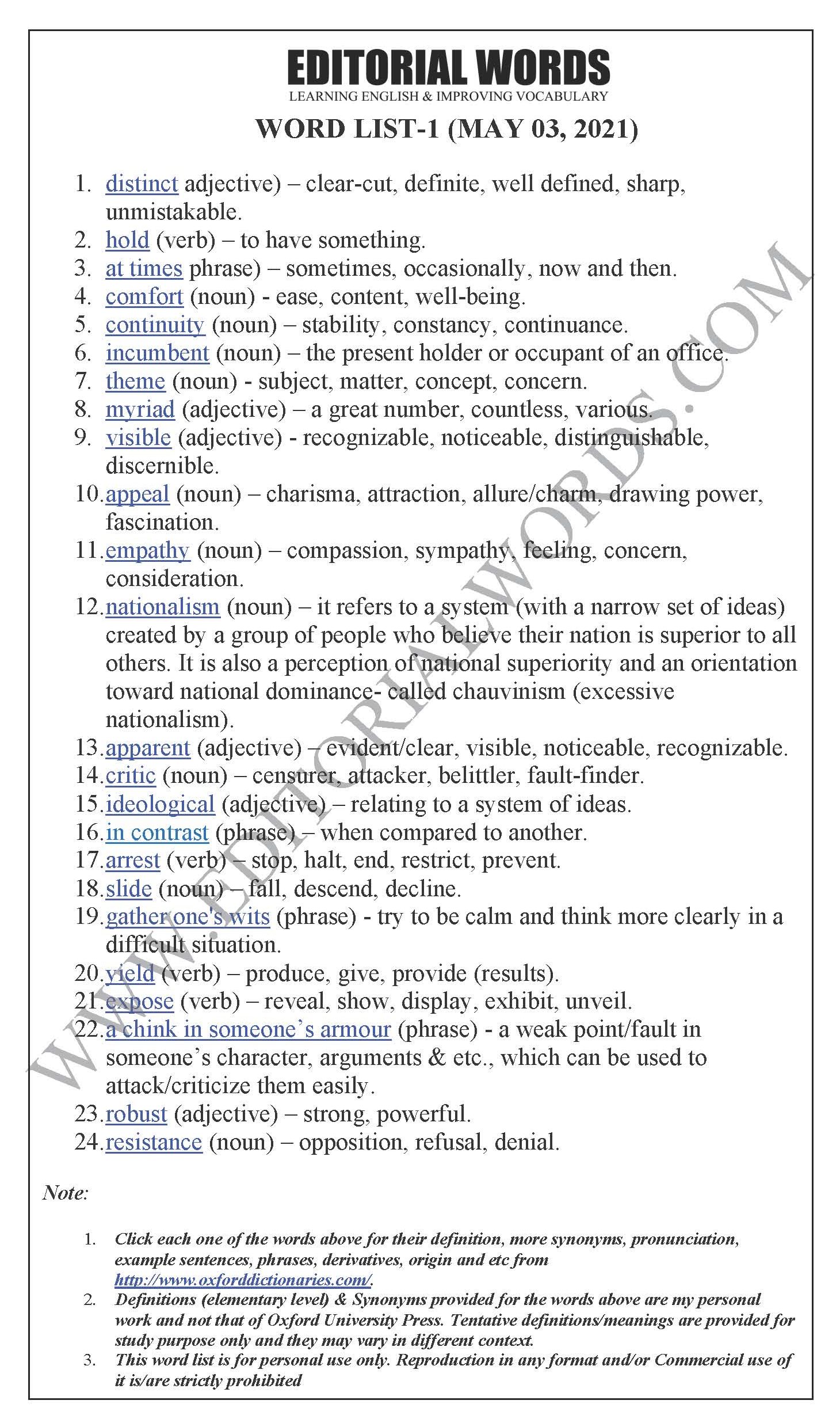
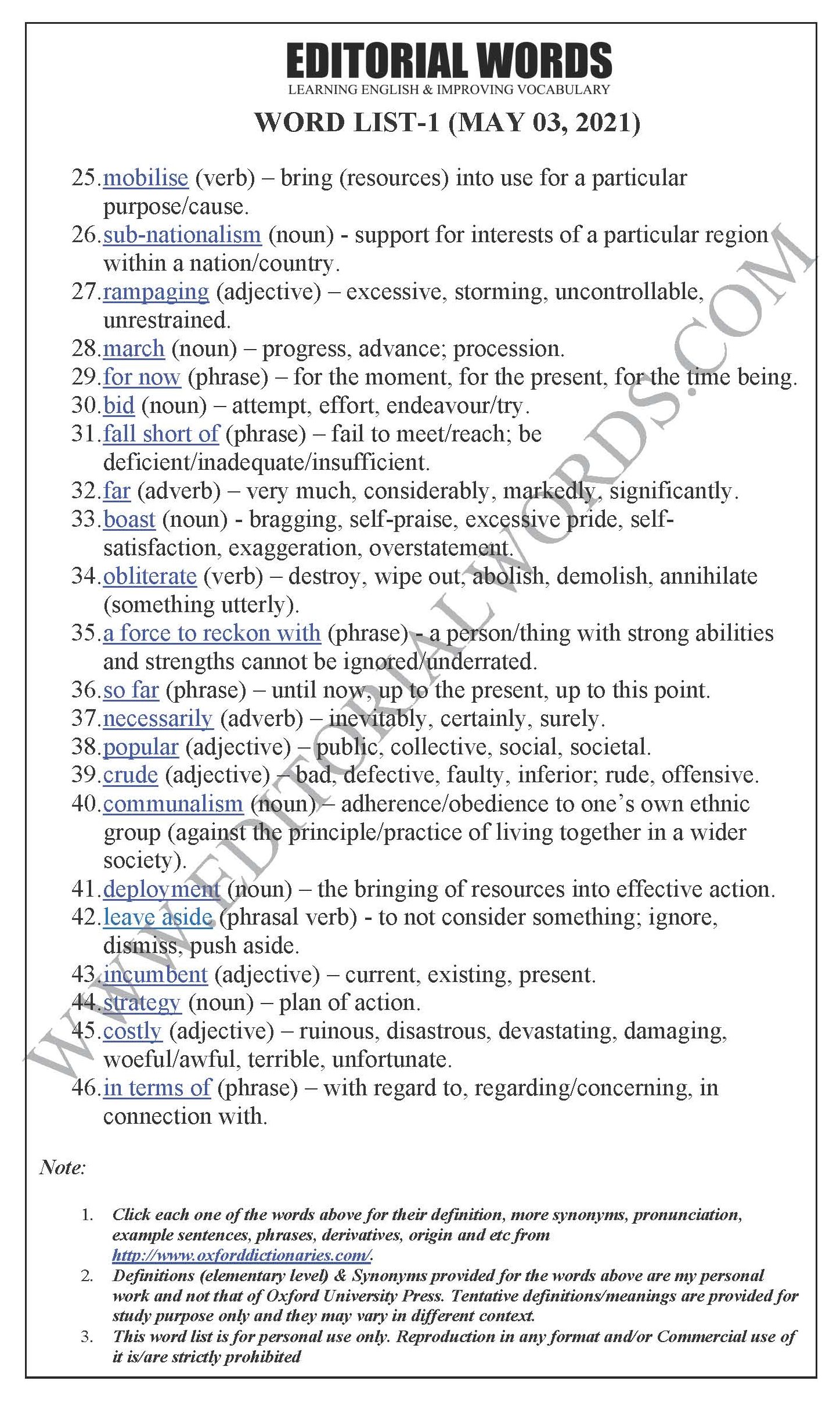
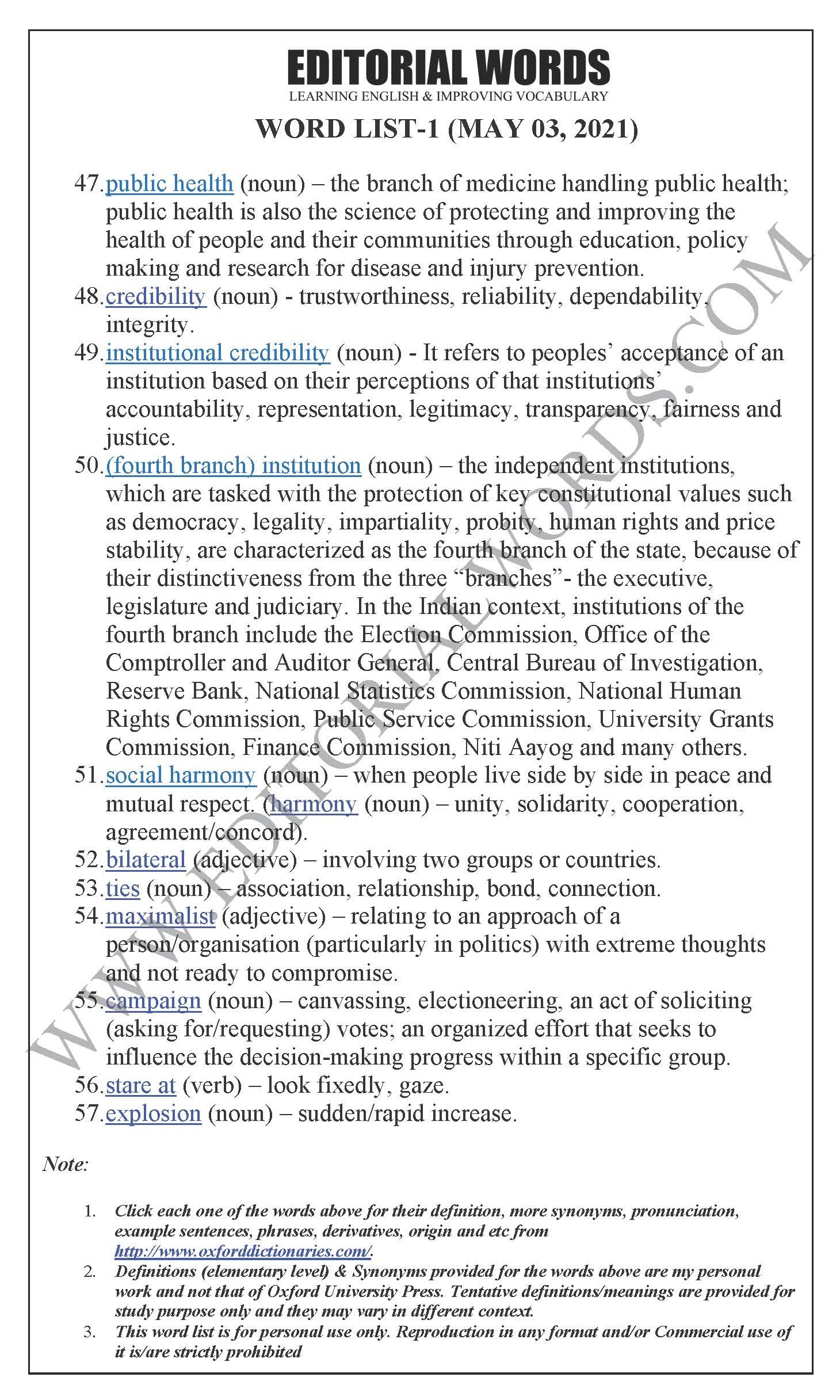
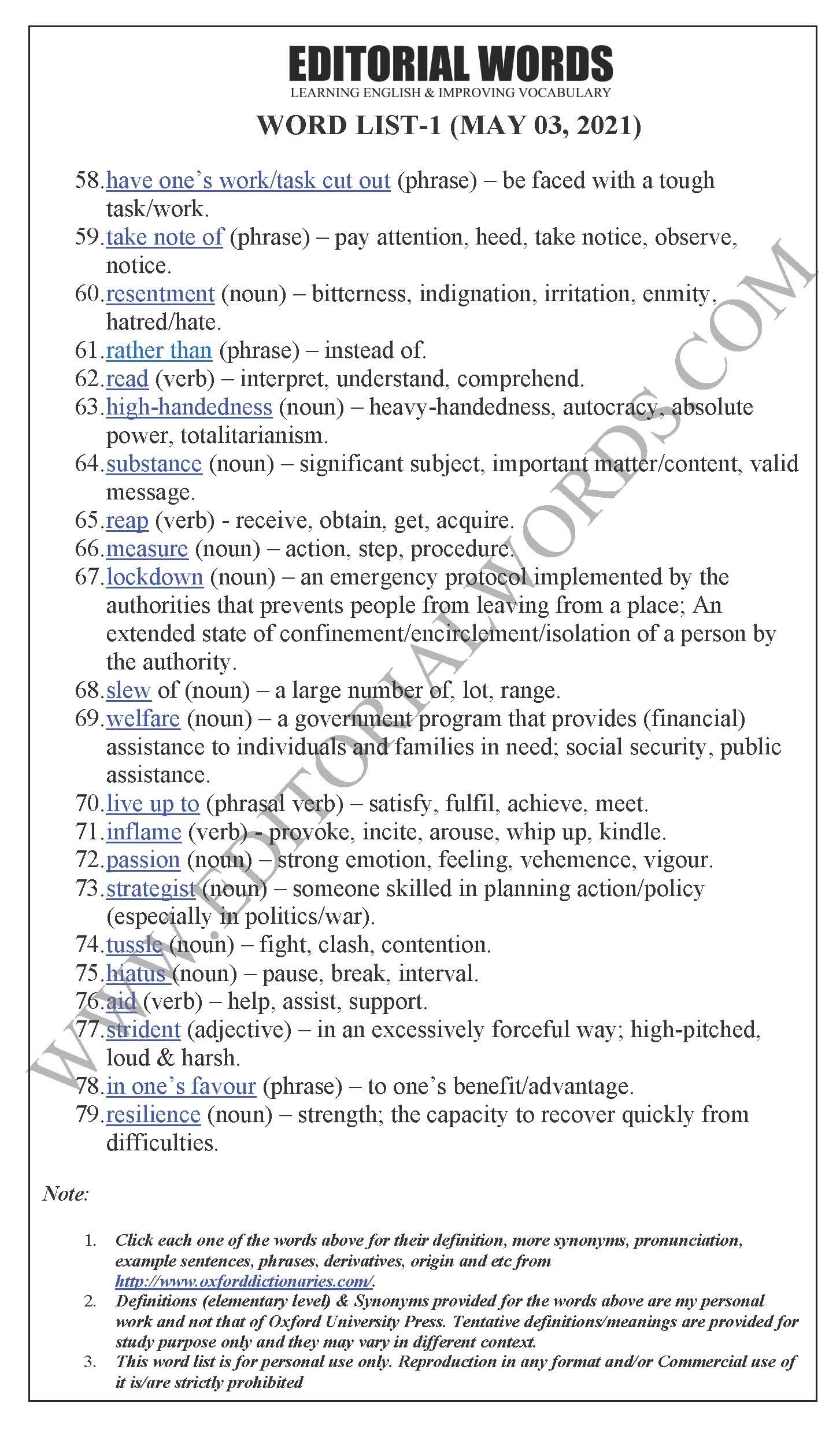
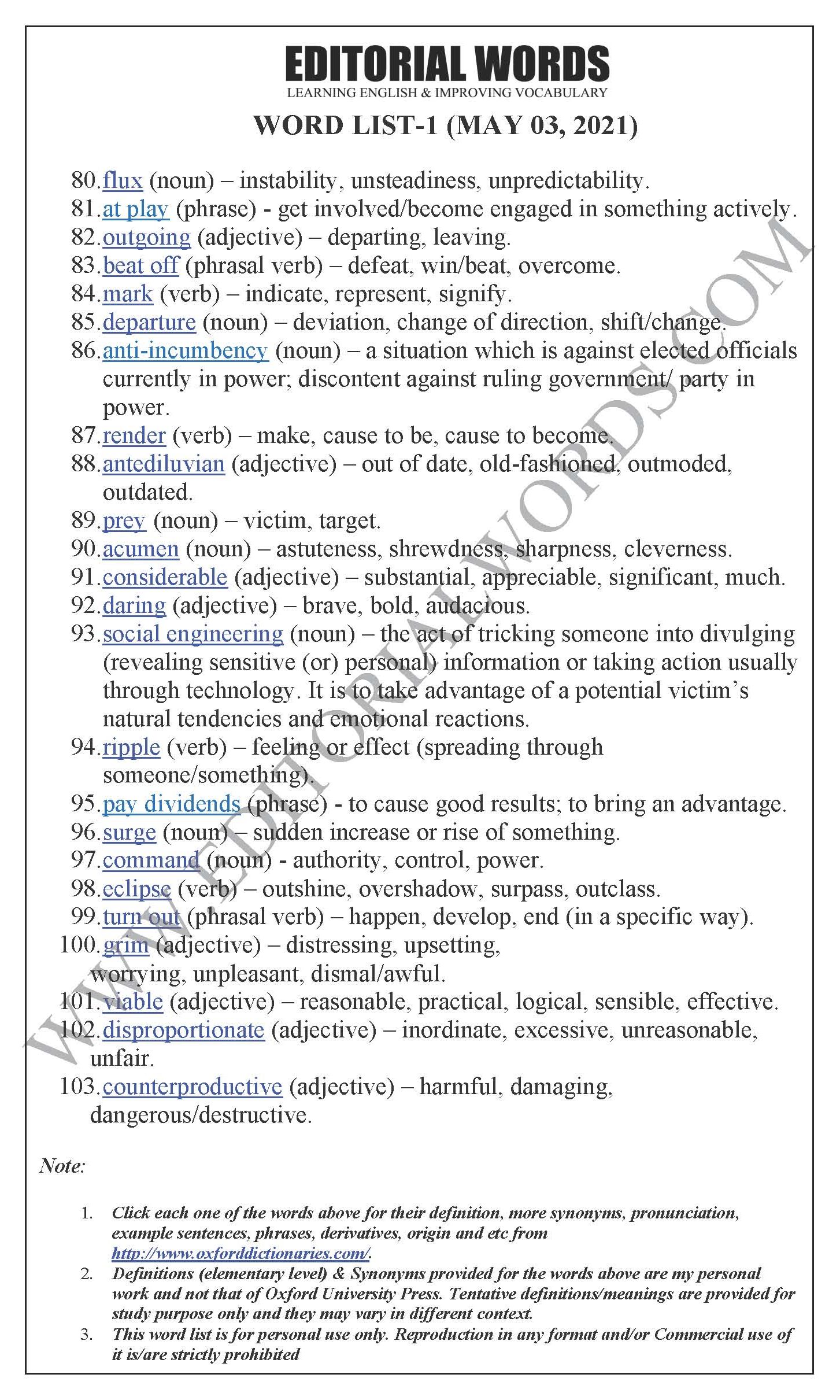
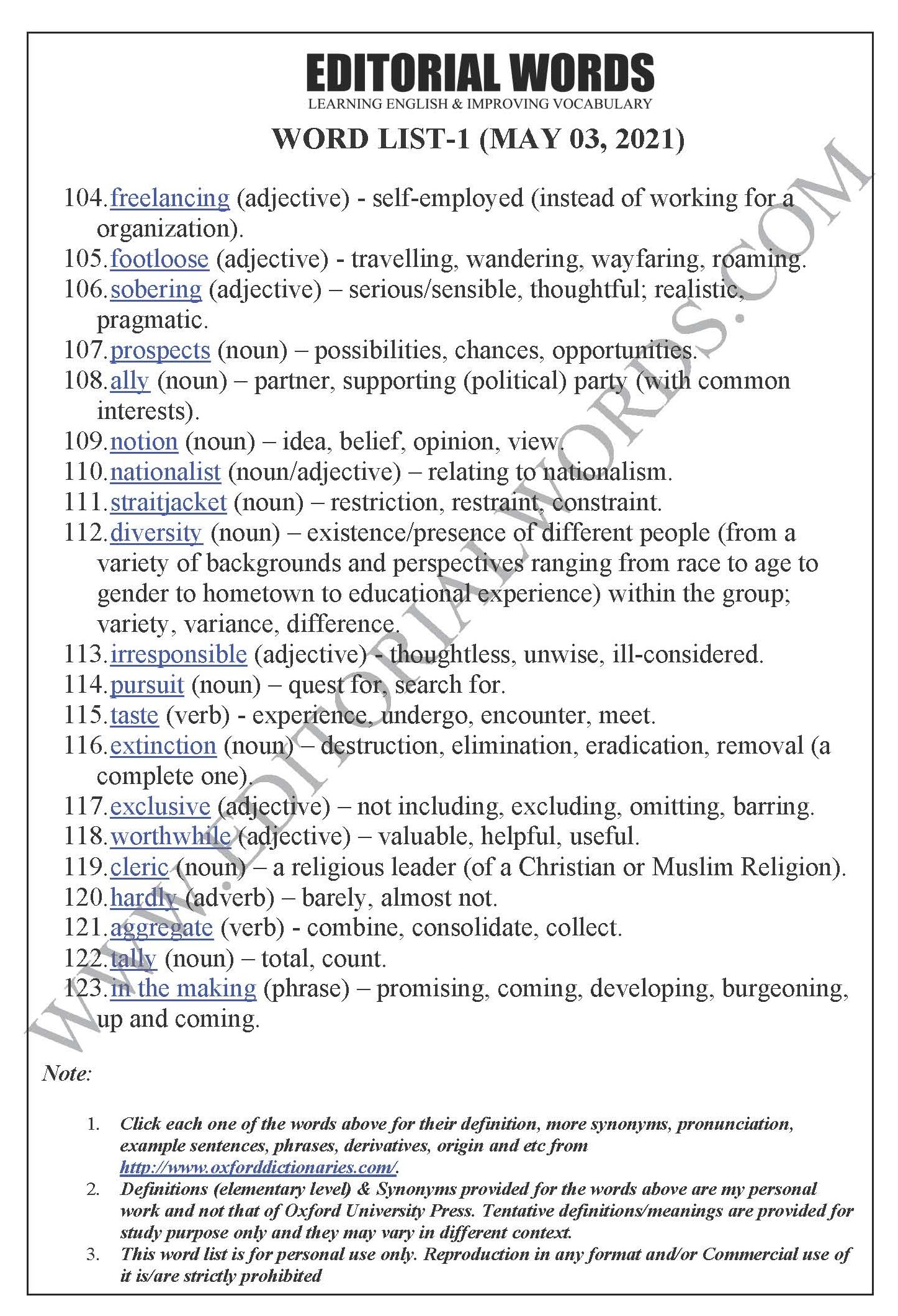
“Phrasal Verbs” We Learnt Last Week
“Idioms & Phrases” We Learnt Last Week
“Important Definitions” We Learnt Last Week
Recent Word Lists For The Hindu Editorial Articles

Be the first to comment